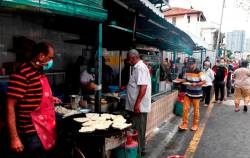FACTBOX-Latest on the worldwide spread of the coronavirus
(Updates with fresh developments)
July 8 (Reuters) - As the World Health Organization acknowledged "evidence emerging" of the airborne spread of the coronavirus, a U.N. report warned that a rush by countries to buy personal protective equipment has created an opportunity for criminal groups, which are peddling sub-standard equipment and are likely to move on to medicines soon.
DEATHS AND INFECTIONS
* For an interactive graphic tracking the global spread, open https://tmsnrt.rs/3aIRuz7 in an external browser.
* For a U.S.-focused tracker with state-by-state and county map, open https://tmsnrt.rs/2w7hX9T in an external browser.
* Eikon users, see MacroVitals (cpurl://apps.cp./cms/?navid=1592404098) for a case tracker and a summary of developments.
EUROPE
* New French Prime Minister Jean Castex said on Wednesday that in case of a new major coronavirus outbreak, any new lockdown would be targeted, not nationwide.
* Austria is issuing travel warnings for Bulgaria, Romania and Moldova because of the worsening coronavirus situation in those countries and clusters in Austria involving people arriving from the region, the government said.
AMERICAS
* A top U.S. health official said the U.S. and other countries could have had a stronger initial response to COVID-19 if China had been more forthcoming about key features of the virus.
* Colombia's national lockdown to control the spread of coronavirus will be extended by just over two weeks until Aug. 1, President Ivan Duque said on Tuesday.
* Brazilian President Jair Bolsonaro said on Tuesday he tested positive for the novel coronavirus after months minimizing the severity of the pandemic and defying medical experts.
ASIA-PACIFIC
* Australia should slow down the return of its citizens from abroad, as the country grapples with a fresh coronavirus outbreak that has forced it to isolate its second most populous state.
* Uzbekistan will impose a second wave of lockdown restrictions between July 10 and Aug. 1.
* Thailand expects to delay plans for so-called travel bubbles given a resurgence in coronavirus infections in countries that had managed to contain the initial outbreak, a senior official told Reuters.
* Supercomputer-driven models simulated in Japan suggested that operating commuter trains with windows open and limiting the number of passengers may help reduce the risk of coronavirus infections.
* Three hundred drones took to the evening sky over the Han River in South Korea to dispense coronavirus prevention advice.
MIDDLE EAST AND AFRICA
* In Africa, lack of coronavirus data raises fears of "silent epidemic".
* Iran has recorded its highest number of deaths from COVID-19 within a 24-hour period, Health Ministry figures showed on Tuesday.
MEDICAL DEVELOPMENTS
* Vaccine maker GSK has put its vaccine booster technology to work in a potential new COVID-19 shot, to be developed with a Canadian biopharmaceutical company backed by Philip Morris.
ECONOMIC FALLOUT
* Global stocks faltered on Wednesday, losing momentum after a five-day rally, as an increase in new coronavirus cases in some parts of the world undermined prospects for a quick economic recovery.
* The French economy is set to rebound sharply in the second half of the year after an unprecedented slump in the first half, the INSEE statistics agency said.
* British finance minister Rishi Sunak will announce on Wednesday his next moves to prevent a wave of job cuts from snowballing into a full-blown unemployment crisis in the world's sixth biggest economy.
* The Norwegian economy rebounded in May after two months of steep decline as a gradual reopening of businesses helped turn activity around, Statistics Norway (SSB) said.
* Japan's service sector sentiment jumped at a record pace in June, a Cabinet Office survey revealed, indicating the economy may have reached the bottom of its coronavirus-induced slump.
* The Philippine government expects the country's debt-to-GDP ratio to rise to 50% from 39% last year, as it increases borrowing.
(Compiled by Linda Pasquini, Devika Syamnath and Aditya Soni; Editing by Sriraj Kalluvila and Alex Richardson)






